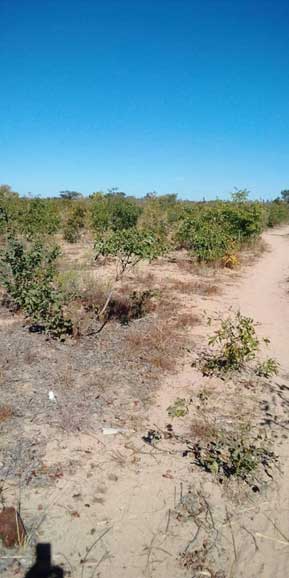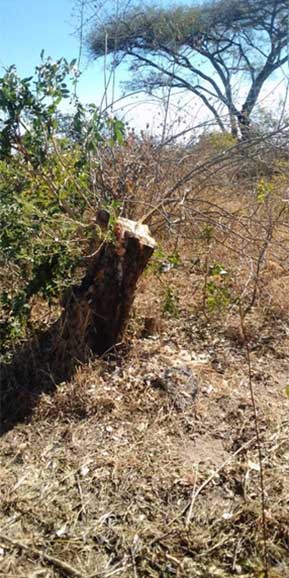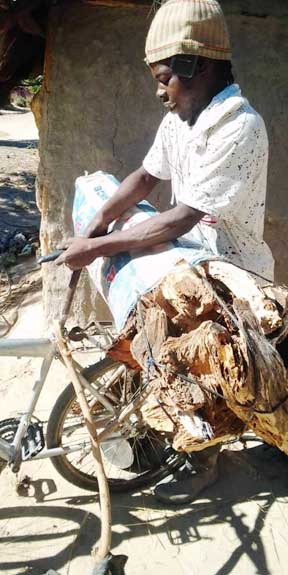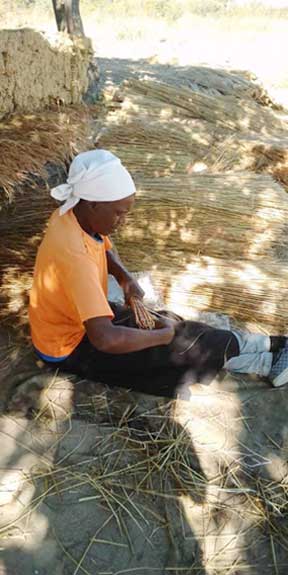SAVING OUR COMMUNITY BY SAVING WITH OUR COMMUNITY!
Our Gateway Fellow from the Epworth Cohort has been working on an initiative to break the cycle of poverty among its residents. In his ward, there are around sixty households, each with an average of five family members, living on contested land in an extremely economically marginalised reality. The main source of income for many of these residents, especially during the lockdown, has been gathering and selling firewood and thatching grass to neighbouring suburbs. This has resulted in massive levels of deforestation in the area, where spaces that were once covered by thick forest are now bare and barren, stripped of most vegetation.


The forest area close to the Gateway Zim Fellow’s home, which is being destroyed rapidly due to firewood cutting.
This particular Gateway Fellow, has worked on initiatives to build sustainable communities elsewhere, and says “The lockdown made me have to work within my immediate community, as I could no longer travel…where I normally operate from.”
He says during this time, he began to look around his own community, observing consumption patterns and how the current means of generating income were having adverse effects on the environment. He also observed how much those around him were constantly struggling financially. In an analogy, he compared the economy to the blood flowing through the human body system. He likened his community to a limb that is deprived of this vital lifeblood, which inevitably becomes and remains weak and ineffective. It was clear to him that a solution was needed and he knew that the community had to work together to find that solution on its own.
“The pandemic taught us that if we are not organised, we will always cry foul. Organisation is key.”
By organisation, he means that the community needs to co-create and register legal entities that can be run professionally. They would register themselves as a trust or a cooperative, set up a community-owned shop or enterprise and use this as an economic pivoting point for themselves.
He calls it the Community Economic Development Life-Cycle Initiative, which involves three steps. The first step, he says, is to sensitise the community on the contentious issues of their present consumption trends. He needs to help residents see that destroying their environment as a means to survive is undesirable and encourage residents to find alternative and more sustainable sources of income.


Some of the community members. They make a living from selling firewood and thatch, neither of which are are eco-friendly, sustainable or very profitable.
The second step is to mobilise the community to come together and start a community-owned enterprise. The Gateway Zimbabwe Fellow has already started engaging community members and has been quite successful, with a number of them pledging support for the project by putting in a commitment fee, starting from one dollar per person, accumulating to a $5 once-off commitment fee. Others are still slowly coming forward, as and when they are able to make enough money from their work as informal traders and casual labourers, which has been greatly affected by the advent of the Covid-19 crisis. But those who cannot afford to make this contribution, as is the case with a majority of residents, make up for the fee through their commitment in buying from the community shop.
“We are taking Ubuntu to the next level and reclaiming our sense of wealth. The current capitalist economic trends have reduced us into consumers, living from hand to mouth. That lifestyle has deprived us of self-determination.”
The group that made initial contributions came up with a list of about twenty commonly used commodities. At the beginning of June, they used the money they had put together to buy these basic commodities in bulk, to stock up their “shop” – operating from one of their colleagues’ home, which the rest of the community now buys from. This act of saving from collective consumption will lead to self- determination, improved food security and with that the community members enjoy better nutritional health.
The third step of the cycle involves using the savings from the shop as a resource pool for next level of investments. At this stage they will look at the viable opportunities within the community. Those who want to venture into any form of business that they are passionate about, will get investment from the community fund. One idea is to invest in the children’s education, by setting up a local TV school, where teachers will record lessons for the children to access on television, so that they are able to continue with their home-schooling until it is safe for them to return to school.
Many other project ideas are being considered, especially those that will bring essential skills and services to be available to the community, being given by other community members whom they will have assisted to set up their businesses, using their collective savings.
“Our communities are rich, in terms of skills and talents, passion,” says Gateway Zim Fellow. “Taking advantage of technology and using social media platforms, we will create network marketing and network trading.” Doing business amongst themselves, goods and services will be exchanged within the community, which means minimal movement, in compliance with the Covid-19 pandemic lockdown restrictions. The money will circulate within the community and consumption can be used as an asset, no longer as an expenditure. The collective savings can be used to invest in the community’s common goals.
This Gateway Zim Fellow believes that his model can bring about economic progress and equity to his community and can easily be replicated throughout other communities in the Gateway Zimbabwe network. We already knew it, but COVID-19 has emphasized the need for more inclusive and sustainable economic models. At Gateway Zimbabwe, we are proud to provide catalytic support to initiatives such as these. These are the seeds of the future sprouting as communities reclaim their agency and co-create the reality they want.